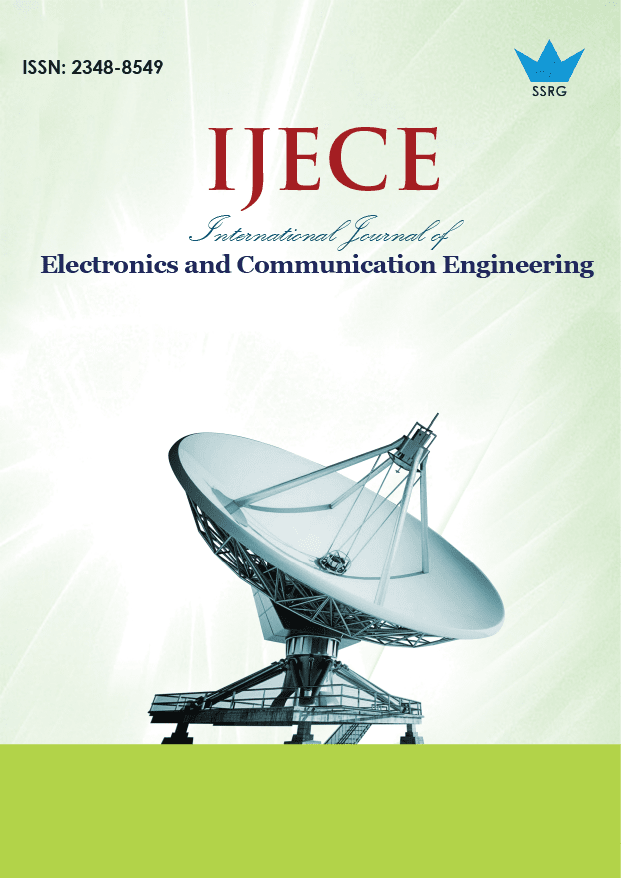Intelligent Resource Scheduling in Mobile Edge Clouds Using Adaptive Queueing and Meta-heuristics

| International Journal of Electronics and Communication Engineering |
| © 2025 by SSRG - IJECE Journal |
| Volume 12 Issue 8 |
| Year of Publication : 2025 |
| Authors : B.Teja Sree, G.P.S.Varma, Indukuri Hemalatha |
How to Cite?
B.Teja Sree, G.P.S.Varma, Indukuri Hemalatha, "Intelligent Resource Scheduling in Mobile Edge Clouds Using Adaptive Queueing and Meta-heuristics," SSRG International Journal of Electronics and Communication Engineering, vol. 12, no. 8, pp. 199-209, 2025. Crossref, https://doi.org/10.14445/23488549/IJECE-V12I8P118
Abstract:
The key aspect of Mobile Edge Computing (MEC) that has aroused considerable concern is how to efficiently schedule tasks and allocate resources to meet real-time applications' low latency and energy requirements. Classical scheduling algorithms such as First-Come-First-Served (FCFS), Shortest Job First (SJF), and Round Robin (RR) are largely ineffective for managing dynamic workloads and heterogeneous resource environments. This paper proposes A delay energy-efficient queuing-based Particle Swarm Optimization (DAEE-QPSO) algorithm that combines queuing theory and swarm intelligence to optimize task offloading decisions. Individual nodes of edges are represented by M/M/1 queues that allow the queuing delay and system congestion to be estimated perfectly. A hybrid fitness function is constructed that attempts to concurrently reduce the runtime and energy usage of tasks and constraints (meeting task deadlines and energy budgets). The proposed DAEE-QPSO algorithm shows the lowest average run time and energy consumption compared to FCFS and EADF-PSO. It also has high task throughput and maintains the greatest average energy saving of up to 29.8%, outperforming Energy Aware Double Fitness Function PSO (EADF-PSO) by only 23.3%. This result demonstrates its effectiveness in improving task efficiency in a mobile edge cloud. The suggested architecture is very applicable to energy-conscious and real-time usage in the cloud-to-edge environment.
Keywords:
Edge computing, Mobile Edge computing, Task scheduling, Delay Awareness, Queuing theory, Cloud computing, Resource Allocation.
References:
[1] Peter Mell, and Tim Grance, “The NIST Definition of Cloud Computing,” National Institute of Standards and Technology, pp. 1-7, 2011.
[CrossRef] [Google Scholar] [Publisher Link]
[2] Dzmitry Kliazovich, Pascal Bouvry, and Samee Ullah Khan, “GreenCloud: A Packet-Level Simulator of Energy-Aware Cloud Computing Data Centers,” The Journal of Supercomputing, vol. 62, pp. 1263-1283, 2012.
[CrossRef] [Google Scholar] [Publisher Link]
[3] Mohamed Abd Elaziz et al., “Task Scheduling in Cloud Computing Based on Hybrid Moth Search Algorithm and Differential Evolution,” Knowledge-Based Systems, vol. 169, pp. 39-52, 2019.
[CrossRef] [Google Scholar] [Publisher Link]
[4] Sukhpal Singh, and Inderveer Chana, “A Survey on Resource Scheduling in Cloud Computing: Issues and Challenges,” Journal of Grid Computing, vol. 14, pp. 217-264, 2016.
[CrossRef] [Google Scholar] [Publisher Link]
[5] AR. Arunarani, D. Manjula, and Vijayan Sugumaran, “Task Scheduling Techniques in Cloud Computing: A Literature Survey,” Future Generation Computer Systems, vol. 91, pp. 407-415, 2019.
[CrossRef] [Google Scholar] [Publisher Link]
[6] Mahendra Bhatu Gawali, and Subhash K. Shinde, “Task Scheduling and Resource Allocation in Cloud Computing Using a Heuristic Approach,” Journal of Cloud Computing, vol. 7, pp. 1-16, 2018.
[CrossRef] [Google Scholar] [Publisher Link]
[7] Mohit Agarwal, and Gur Mauj Saran Srivastava, “A PSO Algorithm Based Task Scheduling in Cloud Computing,” International Journal of Applied Metaheuristic Computing, vol. 10, no. 4, pp. 1-17, 2019.
[CrossRef] [Google Scholar] [Publisher Link]
[8] Pengfei Wang et al., “Joint Task Assignment, Transmission, and Computing Resource Allocation in Multilayer Mobile Edge Computing Systems,” IEEE Internet of Things Journal, vol. 6, no. 2, pp. 2872-2884, 2019.
[CrossRef] [Google Scholar] [Publisher Link]
[9] Binh Minh Nguyen et al., “Evolutionary Algorithms to Optimize Task Scheduling Problem for the IoT Based Bag-of-Tasks Application in Cloud–Fog Computing Environment,” Applied Sciences, vol. 9, no. 9, pp. 1-20, 2019.
[CrossRef] [Google Scholar] [Publisher Link]
[10] Xudong Niu et al., “Workload Allocation Mechanism for Minimum Service Delay in Edge Computing-Based Power Internet of Things,” IEEE Access, vol. 7, pp. 83771-83784, 2019.
[CrossRef] [Google Scholar] [Publisher Link]
[11] Gagandeep Kaur, Balraj Singh, and Muhammad Faheem, “Bioinspired Adaptive Resource Scheduling for QoS in Mobile Edge Deployments,” IET Communications, vol. 19, no. 1, pp. 1-14, 2025.
[CrossRef] [Google Scholar] [Publisher Link]
[12] Ming Chen et al., “Genetic Algorithm with Skew Mutation for Heterogeneous Resource-Aware Task Offloading in Edge-Cloud Computing,” Heliyon, vol. 10, no. 12, pp. 1-17, 2024.
[CrossRef] [Google Scholar] [Publisher Link]
[13] Pijush Kanti Dutta Pramanik, Tarun Biswas, and Prasenjit Choudhury, “Multicriteria-Based Resource-Aware Scheduling in Mobile Crowd Computing: A Heuristic Approach,” Journal of Grid Computing, vol. 21, 2023.
[CrossRef] [Google Scholar] [Publisher Link]
[14] Qi Zhang et al., “Task Offloading and Resource Scheduling in Hybrid Edge-Cloud Networks,” IEEE Access, vol. 9, pp. 85350-85366, 2021.
[CrossRef] [Google Scholar] [Publisher Link]
[15] Rajni Aron, and Ajith Abraham, “Resource Scheduling Methods for Cloud Computing Environment: The Role of Meta-Heuristics and Artificial Intelligence,” Engineering Applications of Artificial Intelligence, vol. 116, 2022.
[CrossRef] [Google Scholar] [Publisher Link]
[16] Yufei Wang et al., “Resource Scheduling in Mobile Edge Computing Using Improved Ant Colony Algorithm for Space Information Network,” International Journal of Satellite Communications and Networking, vol. 41, no. 4, pp. 331-356, 2023.
[CrossRef] [Google Scholar] [Publisher Link]
[17] Jia Ru, and Jacky Keung, “An Empirical Investigation on the Simulation of Priority and Shortest-Job-First Scheduling for Cloud-Based Software Systems,” 2013 22nd Australian Software Engineering Conference, Hawthorne, VIC, Australia, pp. 78-87, 2013.
[CrossRef] [Google Scholar] [Publisher Link]
[18] Ashkan Emami Ale Agha, and Somayyeh Jafarali Jassbi, “A New Method to Improve Round Robin Scheduling Algorithm with Quantum Time Based on Harmonic-Arithmetic Mean (HARM),” International Journal of Information Technology and Computer Science, vol. 5, no. 7, pp. 56-62, 2013.
[CrossRef] [Google Scholar] [Publisher Link]
[19] A.V. Karthick, E. Ramaraj, and R. Ganapathy Subramanian, “An Efficient Multi Queue Job Scheduling for Cloud Computing,” 2014 World Congress on Computing and Communication Technologies, Trichirappalli, India, pp. 164-166, 2014.
[CrossRef] [Google Scholar] [Publisher Link]
[20] Yao Lu et al., “EA-DFPSO: An Intelligent Energy-Efficient Scheduling Algorithm for Mobile Edge Networks,” Digital Communications and Networks, vol. 8, no. 3, pp. 237-246, 2021.
[CrossRef] [Google Scholar] [Publisher Link]

 10.14445/23488549/IJECE-V12I8P118
10.14445/23488549/IJECE-V12I8P118